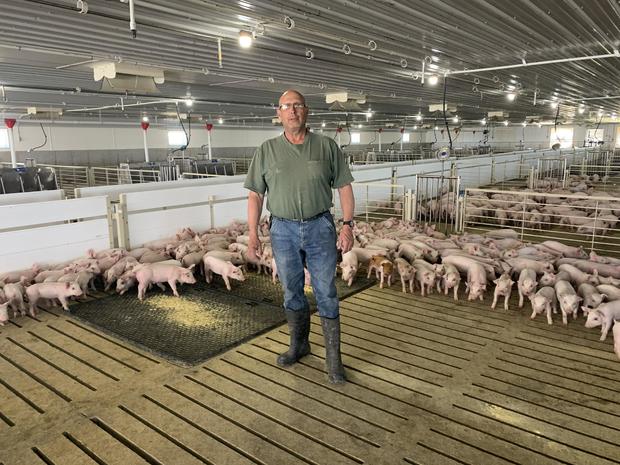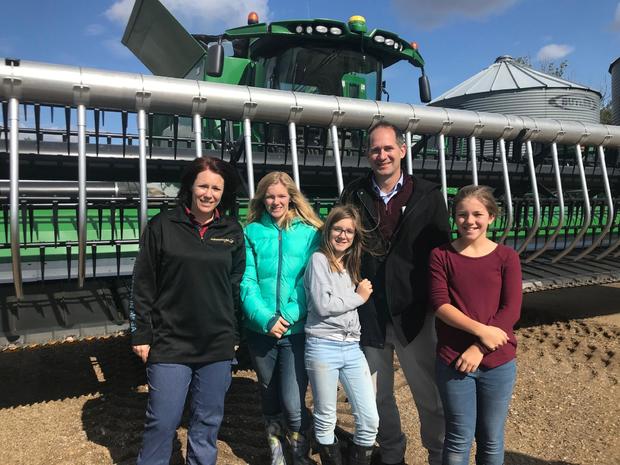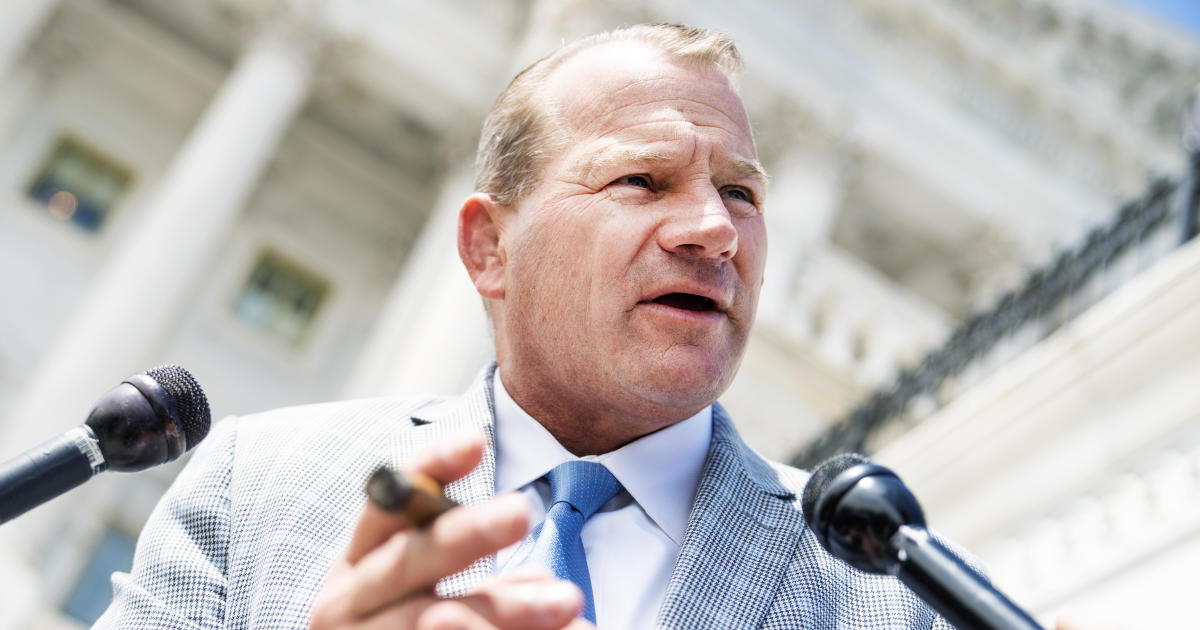COVID-19 exacts a high cost from Minnesota hog farmers
CBS News is chronicling what has changed for the lives of residents of some of the biggest battleground states in 2020 amid the coronavirus pandemic.
Dave Mensink, a hog farmer in southeastern Minnesota, estimates that the COVID-19 crisis is costing him between $22 to $26 per pig over the next 12 months, at current Chicago Mercantile Exchange prices. That adds up to about $160,000 to $187,000 in projected revenue loss, since he has about 7,200 pigs on his 3,800-acre lot, along with a small herd of cattle.
Mensink, who considers himself an eternal optimist, has been bracing for the financial hit. The pandemic has driven down the demand for pigs in the food supply chain as restaurants closed their doors in response to stay-at-home orders. He's also been in a state of transition, passing the farm down to his son and his daughter-in-law.
Hog production has slowed for Minnesota farmers after some meat processing plants were briefly closed because of outbreaks in COVID-19 among their employees. Mensink's pigs are delivered to the Hormel processing plant in Austin, Minnesota, which has not closed but has slowed its harvest rate.
The economic outlook is daunting for Mensink, who said his goal is make $10 to $15 in profit per pig. The economic situation may be worse for other hog farmers in Minnesota, which currently ranks as second in the nation in hog production.
"This is not sustainable," Mensink said. "We've got a huge investment in this swine production system and we just think this thing has to get better at some point."
While the state's hog farmers are experiencing a financial strain, there is also an emotional toll for some hog farmers because they have had to euthanize their pigs as demand in the food supply chain has dropped. Thom Peterson, the commissioner of Minnesota's Agriculture Department, told CBS News that he estimates more than 100,000 pigs have been euthanized in the state.
Mike Patterson is part of a co-operative with about a dozen families that raises pigs near Kenyon, Minnesota. Patterson's co-op made the tough decision to depopulate and euthanize nearly 3,400 pigs, worth about $500,000. Patterson, who sits on the board of directors for his co-op and has served on various other boards, said voting to depopulate and euthanize the pigs was "the most difficult vote" he's cast.
"To authorize the, you know, the euthanasia or depopulation of those hogs was a difficult decision," Patterson said.
The Smithfield Foods, Inc. plant closure in Sioux Falls, South Dakota impacted Patterson because he has a contract to deliver hogs to that meat processing plant. On April 11, he received a letter from Smithfield notifying him that the plant was temporarily shutting down, four days before his first scheduled delivery on April 15. To keep his pigs from gaining too much weight because his space is limited, Patterson modified their meals. While the Smithfield plant was temporarily closed, Patterson secured some deliveries to local butcher shops throughout May and June.
Patterson said he delivered three semi-loads of pigs, approximately 170 pigs per semi-load, to the Smithfield plant last week. But the loss of revenue is still drastic for farmers and Patterson and Mensink are calling on Congress to come to an agreement to compensate families that have had to euthanize pigs.
An email from the Minnesota Department of Agriculture's office shows the department received $11 million dollars from the state's COVID-19 Relief Fund to aid farmers with disposing of hogs and turkeys. But according to Kevin Paap, the president of the Minnesota Farm Bureau, the cost of raising a pig and the decline in the pig purchase rate is putting multi-generational farms at risk of shutting down.
"You invested that money in the pig. You fed it all year. And then if you have no place to go with it except compost or rendering, you've got all those expenses," Paap explained.
Soybean and corn farmers, too, have been taking a big financial hit because of COVID-19. The business slowdown and stay-at-home orders have meant fewer people on the roads, depressing demand for fuel. Some ethanol plants have temporarily ceased operations. Soybean and corn are also absorbing the loss of sales to farmers who shrinking their herds and hog lots, since the two crops are the main ingredients in animal feed.
Robb Schoenbauer, a soybean and corn farmer in New Prague, Minnesota, said he wasn't able to make some of his scheduled grain shipments to his local ethanol plant because the plant closed for nearly two months.
"Even the grain that we had going elsewhere, the price dropped significantly starting in early March due to lack of demand," Schoenbauer said.
"So, now we sit here and debate at what point the demand is going to pick back up," Schoenbauer added. "And do we cut our losses at this time and shift to market? Or do we hope that there is an uptick in all the markets?"
For Jamie Beyer, a corn and soybean farmer in Wheaton, Minnesota and the president of the Minnesota Soybean Growers Association, the drop in gasoline and biodiesel usage is reflected in low gas prices.
"It has really highlighted for us as farmers like how important those avenues are for using our product domestically," Beyer said. "They have kind of carried us over the past two years through some of the trade disruptions we've had and so to have that pulled out from under us has been a surprise to us."
The coronavirus is just the latest blow to the struggling agricultural economy in the U.S. Some farmers also note the ongoing trade war with China and the retaliatory tariffs has made it difficult for farmers to market their products.
In January, the Trump administration and the Chinese government struck an agreement for a phase one trade deal requiring China to buy some agricultural products from the United States. Some of the farmers were hopeful at the start of the year because of the trade agreement, but tension between the two superpowers over the coronavirus has cast a long shadow over the trade deal.
"We were just about to really make some headway I think with the phase one China deal and just like overnight, it's gone," Beyer said.
While the farmers appreciate the assistance the government has provided so far, some farmers want to see their markets opened beyond the U.S. to grow their business and increase productivity.
"The best thing that the governments could do in my opinion," Schoenbauer said, is "to keep those free trade agreements opened in order to increase demand for U.S. products throughout the world."







